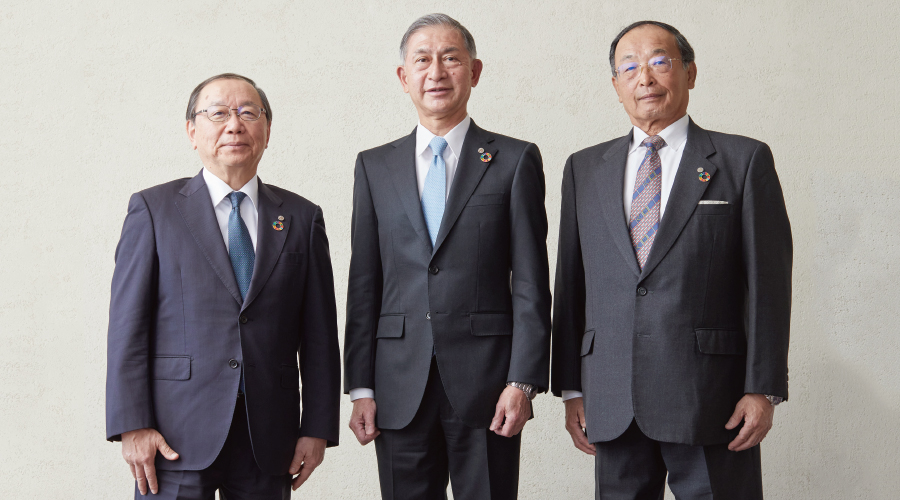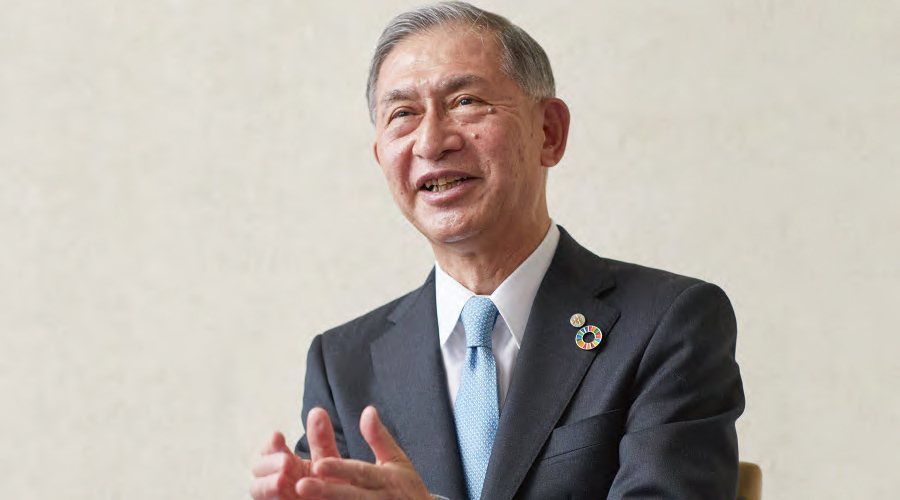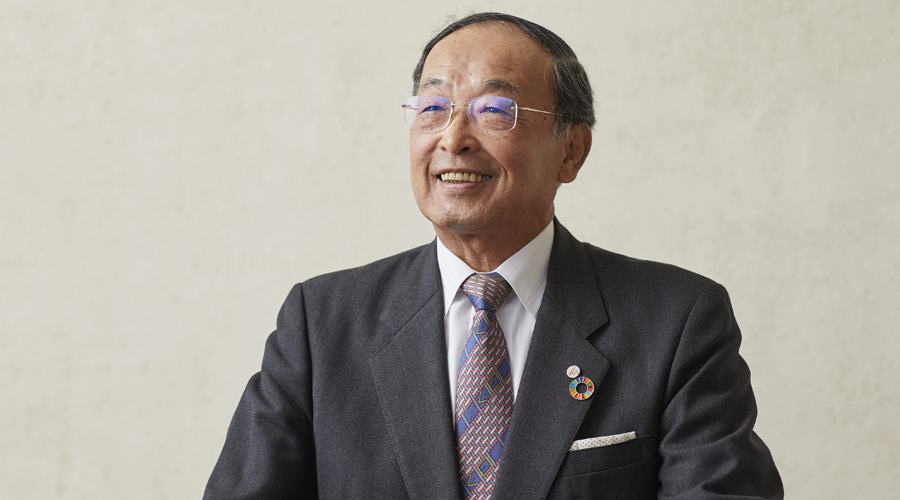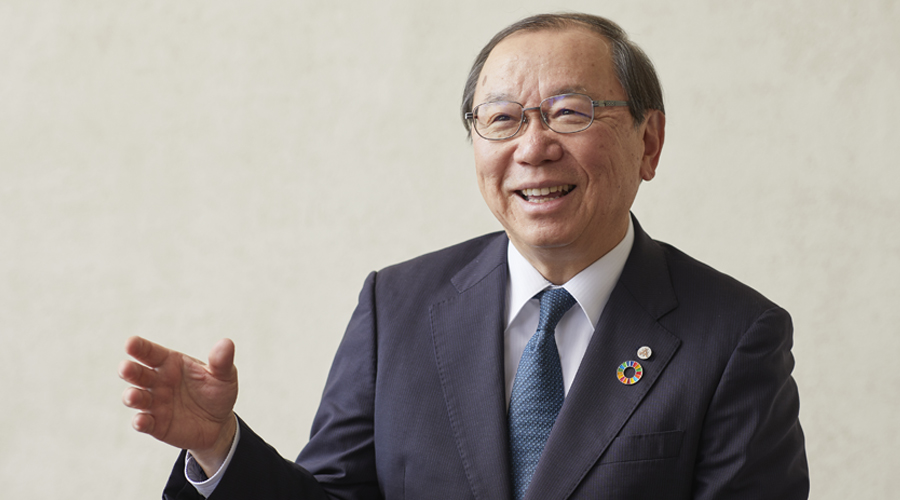
(left)Director and member of the Audit and Supervisory Committee
TERAMURA Yasuhiko
(center)Director and standing member of the Audit and Supervisory Committee
NOMURA Ryuichiro
(right)Director and member of the Audit and Supervisory Committee
MORII Shinichiro
Nomura: |
In addition to auditing the work of the Executive Directors, I work with the Directors to enhance transparency and fairness in corporate governance. At the same time, I try to provide them with advice, drawing from my experience, connections, and expertise. |
Teramura: |
As stipulated by law, and on behalf of the shareholders, my first priority is to establish a corporate governance system through the work of the Executive Directors. I also aim to encourage the Executive Directors to act proactively by leveraging my experience and knowledge to advise them on management policies and areas for improvement. |
Morii: |
supervise the overall management of the company by providing advice on management policies and areas for improvement, focusing on both the “defensive” aspect of striving to maintain an environment in which governance is implemented properly and risks are mitigated, and the “growth-oriented” aspect of achieving sustainable growth, with the ultimate goal of maximizing corporate value. |
Nomura: |
I think the new Medium-Term Business Plan, which was prepared while selecting the Prime Market of the Tokyo Stock Exchange, is appropriate. The target of net sales of 11.6 billion yen by FY2025 (final year of the Medium-Term Business Plan) is well within reach. In the midst of a drastically changing social environment, I believe that stakeholders will appreciate that the company has positioned carbon neutrality as a pillar of its operations, which will lead to an increase in corporate value. |
Teramura: |
The previous Medium-Term Business Plan coincided exactly with the COVID-19 pandemic. Although the company struggled in FY2022 due to delays in assigning newly graduated employees and other factors, client demand for our dispatched engineers remained strong, and there was no significant slowdown of business. Under these circumstances, with respect to strategies by segment, which is one of the Basic Measures of the Medium-Term Business Plan, I believe that the company made steady progress in the recruitment, education, and assignment of talent in each segment. The Audit and Supervisory Committee conducts interviews every year with the individuals in charge of each division within the company, and I feel that appropriate measures are being taken for each segment in terms of recruitment, education, and assignment. The new Medium-Term Business Plan was created in response to the reorganization of the Tokyo Stock Exchange, when the company selected the Prime Market. The basic policies remain unchanged from the previous Medium-Term Business Plan, but the new plan specifies that the company will focus on dispatching engineers to carbon neutral fields. The company has dispatched many engineers to carbon neutral fields so far, and this is a well-timed measure, considering clients’ current needs and the characteristics of the company’s engineers. |
Morii: |
Achieving the targets of the Medium-Term Business Plan will lead to fulfillment of the listing maintenance criteria. To do so, the company needs to closely monitor progress and address any issues and tasks early-on. The market size of the engineer dispatching business and clients’ R&D costs are increasing year after year, so it is important to work toward achieving the goal of reaching 1,600 engineers. |

Nomura: |
The Board of Directors meets twice a month, once to deliberate on the company’s business performance, and once to decide on important matters. Detailed matters are reported at business report board meetings, and management strategies are discussed at regular month-end board meetings, with an eye to increasing corporate value over the medium to long term. I think it is an effective operational approach. In addition, based on the content discussed in these meetings, specific measures are discussed at company-wide verification meetings and management strategy meetings. I think everyone is mindful of streamlining this process for prompt and accurate operational measures. |
Teramura: |
The Board of Directors holds two separate meetings, which helps to narrow down the agenda for each Board of Directors meeting. I believe it operates effectively. Very detailed matters are reported at the business report board meetings. Although it can be a little too detailed, it is helpful for us Outside Directors to understand the situation inside the company. I also appreciate that the board meeting materials are distributed at least one day in advance, and that the documents about important agenda items are presented in advance at a prior board meeting to allow us time to review them carefully. In addition, because I am based at the Tokyo headquarters, I am able to ask questions about detailed matters to the Corporate Planning and Strategy Division on the same floor. This has been very helpful for our auditing activities. |
Morii: |
I think that the bimonthly board meetings and quarterly special board meetings enable all Directors to communicate and share their opinions on policies and issues. |
Nomura: |
The company is aiming to achieve its management philosophy based on the basic policies of cultivating people, employee happiness, corporate governance, and contributing to society. I expect the company to continue to strengthen its efforts around sustainability, including social responsibility and environmental issues. |
Teramura: |
Originally, the company mainly focused its efforts on contributions to society as a form of CSR. In July 2022, however, it reorganized the then CSR Promotion Meeting into the Sustainability Committee, strengthening its efforts to address sustainability issues. The company has been focusing on developing talent and strengthening governance, and I expect it to make further progress toward achieving the goals it has set in its materiality assessment. |
Morii: |
I commend the company for promoting a business plan that places carbon neutrality as one of the pillars of its business activities, and for its progress in tightening governance and compliance. |
Nomura: |
I believe that the company is enhancing its responsiveness by providing educational opportunities for its engineers to improve their skills, and by striving to enhance their technical and human capabilities. I applaud the company for its role in society, which is supporting engineers and working to contribute to the sustainable growth of client companies. |
Teramura: |
Japan’s employment system has changed drastically from one that was mainly based on a model of lifetime employment. Today, in what is also known as the VUCA (Volatile, Uncertain, Complex, and Ambiguous) age, younger generations need to hone their skills even more than our generation and grow up prepared to adapt to any social environment. Artner provides young engineers with job and learning opportunities, and offers a variety of career paths to suit each individual’s respective interests. It can be said that the company is contributing to society by improving Japan’s technical capabilities and providing a place for reskilling. Going forward, I believe that the company can make an even greater contribution to society by further promoting diversity and inclusion in talent management, as outlined in its Medium-Term Business Plan. |
Morii: |
Going forward, the company will need to continue to expand its operations toward carbon neutrality in line with the SDGs. I also think that it is important to engage in community service activities. |

Nomura: |
Meeting the listing maintenance criteria for the Prime Market of the Tokyo Stock Exchange and fulfilling the Medium-Term Business Plan. The company is facing a difficult environment in terms of recruitment and other matters, I am certain that it will achieve these goals. In the future, I hope that Artner will contribute to the creation of a more enriched society by meeting clients’ needs and gaining their confidence through the provision of talent that will contribute to a variety of technologies and services, such as EVs and industrial robots. |
Teramura: |
As discussed by the Nomination and Remuneration Committee, Artner celebrated the 60th anniversary of its founding in 2022, and it will need to pass down the management of the company to the next generation in the not-too-distant-future. The majority of the current officers have been involved in the management of the company since before it went public. I think they need to start searching for and developing talent to lead the next generation right now. Going forward, I hope that young employees will take the initiative in growing the company. |
Morii: |
The aging of Directors and the low utilization rate of women are challenges that the company needs to resolve. I also think there is much room for improvement in cooperation and information-sharing between units. |

Nomura: |
The company must achieve sustained growth and increase its medium- and long-term enterprise value in order to fulfill its responsibility to society in cooperation with shareholders and other stakeholders. I will strive to ensure the effectiveness of corporate governance by exercising my audit capability and being mindful of maintaining objectivity. |
Teramura: |
Although progress on the Medium-Term Business Plan has been smooth so far, the most important things to watch out for are scandals and any other issues that may betray shareholders’ expectations. To avoid this, it is critical to ensure that the company’s Internal Control System is well managed and that everyone deals with issues with a sense of urgency. We, too, are determined to do our utmost to avoid any such issues. |
Morii: |
This is a growing and expanding industry, and market conditions are good. I believe that there is a bright and promising future ahead if the entire company tackles each challenge and plan. |